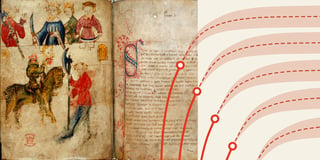Downs and ups in the crossword
Hi there — this is Michi from the Support and Customer Success team. Today I’m writing about the rise and fall of words. (But really, this is just a chance to write about possibly the most interesting sport in the world: jai alai.)
Like many people, I picked up a new hobby during lockdown. While others baked loaves of sourdough bread or tried sticking with yoga for the umpteenth time, I spent most mornings doing the Guardian's "quick crossword" in a conference call with friends. So for my turn on the Weekly Chart, I decided to dig into a dataset of clues and answers from all 1993–2021 New York Times crossword puzzles. I tracked the sudden rise of some now-ubiquitous terms, as well as the slow decline of other once-popular ones. And while researching one of those declining words, I stumbled upon a story of mobsters, game-fixing, and the longest strike in U.S. professional sports history.
But let’s start with some of the “risers” first:
ACAI
Despite being around for thousands of years, the açaí (a kind of Brazilian palm tree and its eponymous berry) made its NYT crossword debut in 2011. It's been clued as a “popular source of antioxidants,” “berry touted as a superfood,” and “___ bowl (dish for the health-conscious).” Açaí started its trendy rise as a popular breakfast for surfers in '90s Brazil, and has since become a staple of metropolitan brunch eateries and organic stores around the world. Perhaps someone more familiar with açaí current events knows what happened in 2021?
IMAC
Appearing 123 times in the 28 years, my personal favorite clues for the Apple desktop computer are “computer that sounds like a theater when pluralized,” “apple that might be seen on a teacher's desk,” and “computer that once came in Bondi Blue.” Couldn’t have possibly appeared before 1998, when the first iMac was released, but what’s particularly nice here is that you can basically spot the years when new versions were released. (That's 1998, 2002, 2004, 2006, 2007, 2009, 2012, 2015, and 2021, for the curious.)
IPA
Before 2012, the Times only clued this with reference to the International Phonetic Alphabet. But that interpretation has shown up only once since then, being almost entirely replaced by the hoppy beer that was the poster child of the 2010s craft beer “revolution.” If you ever wondered about the origin of its name, India Pale Ale was born out of the desire to transport beer on ship journeys from Britain to its colonies, for which a new (and hoppier) recipe had to be developed so the beer would survive the long trip.
NSA
The acronym for the National Security Agency, a U.S. government agency tasked with monitoring foreign signals intelligence and ensuring national cybersecurity. My personal theory for its increased appearance in crosswords would be the whistleblower revelations of mass warrantless surveillance in 2006 (Mark Klein), 2011 (Wikileaks), and 2013 (Edward Snowden), all of which catapulted the agency into the limelight.
Speaking of which, time to shine some light on the words that seem to have faded from the public eye (and that would have had me very frustrated if they appeared in my morning crossword):
ENA
Referring to either Bambi's aunt or Victoria Eugenie of Battenberg (the queen of Spain until 1931), both of whom seem to have fallen out of favor with crossword editors over the years.
CRI
Sometimes clued as “___ de guerre/cœur,” other times as “dernier ___” (but always French). There's a certain fitting irony in dernier cri meaning roughly “the latest trend.”
ESS
Generally a stand-in for "S," both as a letter and a slalom-esque shape. Think clues like: “what's right in front of the tee?” “one of three for Sisyphus?” “shape of a swan's neck,” or “twisty turn.” It's also been clued as a feminizing suffix — think actress, priestess, waitress — which have in fact fallen out of fashion a bit in general. The New York Times actually references this directly in 1996 (“non-P.C. suffix”) and again in 1998, 1999, 2000, 2001, 2010, 2011, 2016, and 2017.
ALAI
While occasionally referring to a mountain range in Kyrgyzstan, I found that this term was mostly clued as “Jai ____.” Jai alai, for those that, like me, do not know it, is a court sport very similar to the Basque pelota (which itself could be described as being a bit like squash, if it were played with a bat similar to a lacrosse stick). If that's piqued your interest, you might want to watch this ad for the sport, which oozes '80s nostalgia.
So why did the once-popular “fastest sport in the world" fall so decisively out of fashion? Well, jai alai was an incredibly popular gambling sport, competing at its peak with horse and greyhound racing — and with that came organized crime. Eventually, changing betting laws and the sport's association with the mob began driving viewers away. Then, from 1988 to 1991, the predominantly Basque players engaged in the longest strike in U.S. sporting history, essentially bringing the game to a standstill, as no professional jai alai was played in the U.S. for that entire time period. If you have 20 minutes to spare and want to find out more about the sport, there's a documentary about it on YouTube.
I’m sure I could spend more time digging into any of these words (or any of the 800,000 rows of data left in the original dataset). But all this writing about crosswords has me wanting to go solve one myself, so that’s it from me for today!
Thanks for reading! If this blog post has whet your appetite for crossword-related think pieces, I can highly recommend this one in the New York Times itself, which includes some great line charts.



